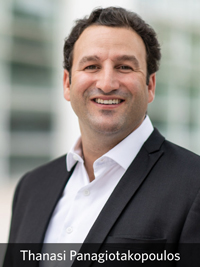Trying to steer a small, year-old independent financial planning practice through the tumult of a global pandemic can be a sticky wicket, but Thanasi Panagiotakopoulos has been challenged before by tough circumstances. Like, for example, the time the home fans spit on him when he was a professional basketball player in Greece.
Granted, these are entirely different circumstances (with different health risks), but Panagiotakopoulos overcame the first challenge and seems well-positioned to make it through the coronavirus situation in good shape with his firm, LifeManaged, the advisory shop he founded in Phoenix in May 2019.
 After he spent a couple of years in the hurly-burly world of pro ball in Greece, Panagiotakopoulos, 34, came home to begin a career in financial services that has included stops at Wells Fargo Advisors and Pathlight Investors. He served as executive vice president and senior wealth advisor at the latter before striking out on his own.
After he spent a couple of years in the hurly-burly world of pro ball in Greece, Panagiotakopoulos, 34, came home to begin a career in financial services that has included stops at Wells Fargo Advisors and Pathlight Investors. He served as executive vice president and senior wealth advisor at the latter before striking out on his own.
He’s currently a registered rep of Dynamic Wealth Advisors, a registered investment advisor with about $1.5 billion under management and roughly 60 advisors across the country. “They’re essentially my outsourced COO,” Panagiotakopoulos said.
“While I’m a registered rep of an RIA, I am an RIA and a fiduciary,” he added. “We have a CFP creating plans. We’re transparent; we don’t sell anything.”
The certified financial planner is Ben Fredlake, 35, who is LifeManaged’s planning director. He spent five years with a firm in the San Francisco Bay Area before returning home to Phoenix.
“I was looking for a paraplanner and spoke to a couple of people who I could mold into a full-fledged advisor, and someone from another firm referred me to Ben,” Panagiotakopoulos said. “We met and it was good timing in that we share the same vision regarding being planning-centric and having a passive management investment philosophy. It’s a good fit. Ben is in all of the meetings with me—right now that’s via Zoom chats—and we work together to deliver the financial plans.”
Panagiotakopoulos said their planning process incorporates a client’s attitude about money and the things that are important in their life. And with his designation as a Behavioral Financial Advisor (BFA), Panagiotakopoulos also focuses on the behavioral side of finances.
“When you talk about investments and helping people get to their goal, to me investments are a means to an end,” he explained. “We talk about how we’re not always rational, and investors have limits of self-control. We try to help them overcome any of their biases, and we do that by trying to understand their investment experience and how that can affect the types of investments we make for them.”
Panagiotakopoulos says a major component of the BFA program, which is issued by Kaplan Financial Education, involves a four-step process centered on the four “R’s”—recognize, reflect, reframe and respond.
“We help clients recognize everything going on in their situation, and how we’re interpreting it and how they’re interpreting it,” Panagiotakopoulos said. “This has been applicable during the pandemic with multiple clients.
“When you remind them of the discussions we had, that’s what the behavior side is,” he continued. “And then they stop getting super-emotional and they don’t want to make irrational decisions.”








